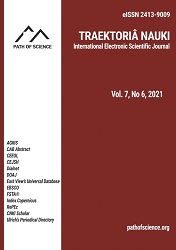Особливості розбудови професійного самоврядування в системі прокуратури, судової влади та адвокатури України
Features of Development of Professional Self-Government in the System of Prosecution, Judiciary and the Bar of Ukraine
Author(s): Ruslan Skrynkovskyy, Myroslav Koval, Andriy Pryveda, Mariana Khmyz, Sviatoslav Kniaz, Dmytro PavlovSubject(s): Constitutional Law, Politics and law
Published by: Altezoro, s. r. o. & Dialog
Keywords: prosecutorial self-government; advocacy self-government; judicial selfgovernment; judiciary; advocacy; prosecutor’s office; justice; proceedings;
Summary/Abstract: Based on a comparative analysis of the sectoral legislation of Ukraine and the practice of its application, the article studies the features of the development of professional self-government in the system of prosecutors, judicial authorities and the bar. It has been found out that prosecutorial self-government in Ukraine is conducted through the Council of Prosecutors of Ukraine (the highest body of prosecutorial selfgovernment in the period between all-Ukrainian conferences of prosecutors) and the all-Ukrainian conference of prosecutors (the highest body of judicial self-government). It has been determined that prosecutorial self-government is a collective independent decision of prosecutors on issues related to the activities of prosecutorial bodies. It has been established that the system of bar self-government bodies in Ukraine is formed by: 1) the Congress of advocates of Ukraine; 2) the Bar Council of Ukraine; 3) the Supreme Qualification and Disciplinary Commission of Advocacy; 4) the Supreme Audit Commission of the Bar; 5) the Regional Conference of Advocates; 6) the Council of Advocates of the region; 7) the Qualification and Disciplinary Commission; 8) the Audit Commission of the region. It has been found that the bodies of judicial selfgovernment in Ukraine are: 1) a meeting of judges, which is a gathering of judges belonging to the corresponding court aimed at discussing the internal activities of such a court and making appropriate collective decisions based on the discussion of such issues; 2) the Council of Judges of Ukraine (the highest body of judicial selfgovernment, which also functions as the executive body of the Congress of Judges of Ukraine); 3) the Congress of Judges of Ukraine (the body that makes decisions that are binding on all bodies of judicial self-government and all courts in Ukraine). It is noted that the prospects for further research in this area are to determine the role of the judiciary in the constitutional and legal mechanism for the protection of human rights and freedoms and to study the requirements for incompatibility of a judge, prosecutor and lawyer with other activities in the context of comparative constitutional law.
Journal: Traektoriâ Nauki
- Issue Year: 7/2021
- Issue No: 06
- Page Range: 1049-1057
- Page Count: 9
- Language: Ukrainian

